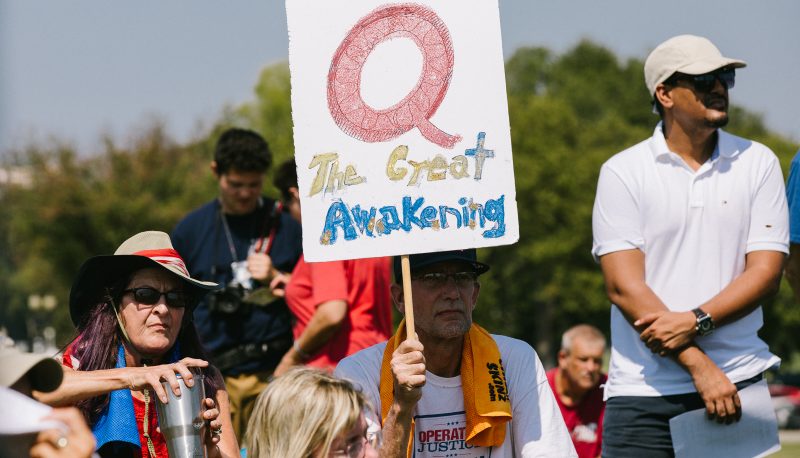Analysis
Some prominent Republicans and institutions are stepping up to denounce the QAnon conspiracy theory after Georgia Republican Marjorie Taylor Greene, who has voiced support for the outlandish conspiracy movement, won her primary runoff this week and became Georgia’s all-but-certain next member of Congress.
Condemnations of Greene and the conspiracy theories she believes are a refreshing change of pace in a Republican party that has allowed the QAnon movement to fester and grow in its ranks with tacit silence and winking online engagement. But the unfortunate truth is that any condemnation, no matter how powerful and from what perch, is likely to be ineffective in halting its spread or dissuading believers. QAnon has existed for nearly three years and has grown into an alternative universe to be reckoned with. As I wrote in July: “GOP leaders could have stopped it, and now it may be too late.”
Greene is among the dozens of Republican candidates seeking office this year who have embraced QAnon, a conspiracy theory that at its core alleges a network of demonic child sex abusers is leading the world and plotting its destruction. The FBI considers QAnon a potential source of domestic terrorism; followers of QAnon have been linked to criminal activity, including kidnapping and murder.
Republican Rep. Adam Kinzinger of Illinois denounced QAnon after Greene’s victory, calling it “a fabrication.”
“Could be Russian propaganda or a basement dweller,” Kinzinger tweeted. “Regardless, no place in Congress for these conspiracies.”
Qanon is a fabrication. This “insider” has predicted so much incorrectly (but people don’t remember PAST predictions) so now has switched to vague generalities. Could be Russian propaganda or a basement dweller. Regardless, no place in Congress for these conspiracies.
— Adam Kinzinger (@RepKinzinger) August 12, 2020
The editors of the National Review published a column yesterday urging Republicans to follow Kinzinger’s lead. They wrote:
House Republicans should go further and deny Greene committee assignments when she arrives in Congress in January. Stripping Iowa Republican Steve King of his committee seats in 2019 sent a message that there are boundaries of decency in the GOP that should not be crossed, and it signaled to GOP primary voters in Iowa that they should choose more wisely next time they had an opportunity. Thankfully, Iowans did just that in June.
Any such move would surely lead Greene to conclude there is a conspiracy against her, but some paranoids deserve enemies.
Managing editor of the Washington Examiner Jay Caruso admitted that his earlier doubt that QAnon believers could take power in Congress “was wrong and the GOP invited this mess.”
Politico reported that Republican Rep. Denver Riggleman of Virginia said the GOP would be in trouble if Greene was the face of its future. “QAnon is the mental gonorrhea of conspiracy theories. It’s disgusting and you want to get rid of it as fast as possible,” he said.
But for every condemnation of QAnon, there were congratulations directed at its followers that seemed to ring louder.
President Donald Trump congratulated Greene on her primary runoff win, calling her a “future Republican Star.”
“Congratulations to future Republican Star Marjorie Taylor Greene on a big Congressional primary win in Georgia against a very tough and smart opponent. Marjorie is strong on everything and never gives up – a real WINNER!” Trump tweeted.
Congratulations to future Republican Star Marjorie Taylor Greene on a big Congressional primary win in Georgia against a very tough and smart opponent. Marjorie is strong on everything and never gives up – a real WINNER!
— Donald J. Trump (@realDonaldTrump) August 12, 2020
The Chicago Tribune reports that Greene maintained support from many of her fellow Georgia Republicans, including Sen. Kelly Loeffler and Rep. Doug Collins. “It’s clear that we need more outsiders with business sense in Washington,” Loeffler said. Rep. Matt Gaetz also offered his support to the QAnon candidate Thursday, tweeting, “Proud to be in your corner, Marjorie!”
House Republicans denounced Greene earlier this year after Politico surfaced a trove of videos in which Greene espoused racist and bigoted views. Republicans began to distance themselves from her candidacy and some endorsed her primary opponent, but nearly all remained mum on QAnon.
QAnon conspiracy theories have also taken root within conservative evangelicalism, an essential part of the GOP base.








